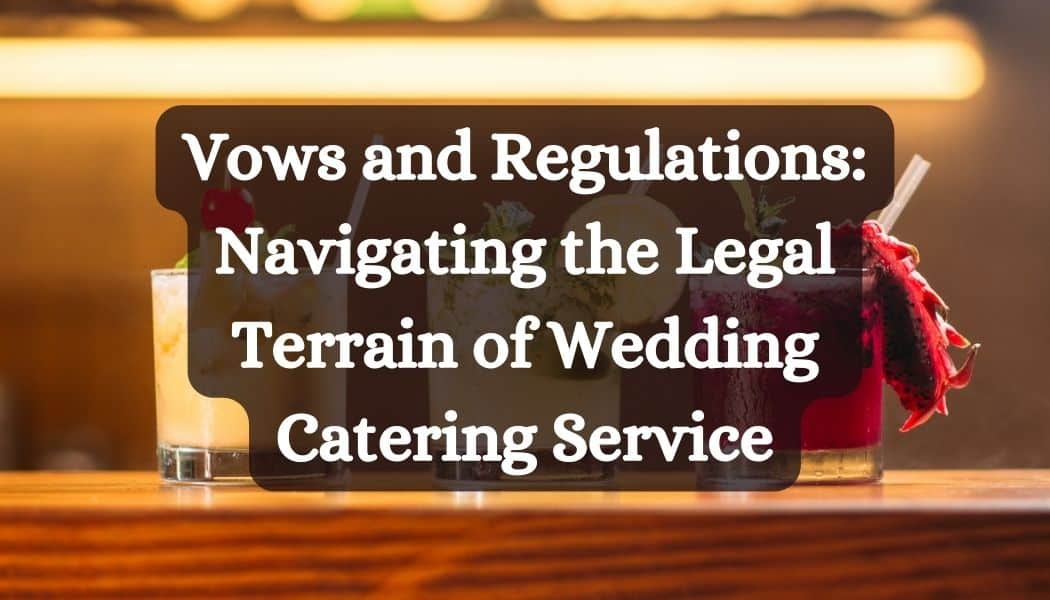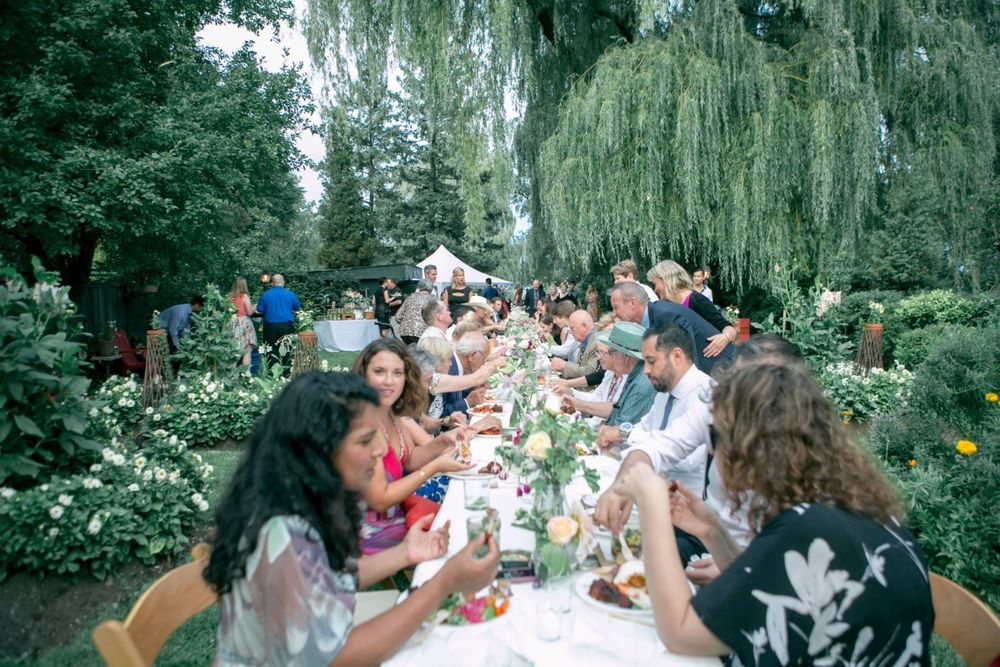
Table of Contents
Key Takeaways
- Recognize the importance of understanding the legal elements involved in your wedding catering service.
- Stay proactive in preventing unpleasant surprises and ensure informed decision-making.
- Stay informed about potential issues like contract conflicts and licensing requirements.
- Validate that your caterer holds the necessary permits (food handling, business operation, and possibly liquor).
- Make sure contracts are well-detailed, protecting all parties and leaving no room for confusion.
- Ensure the quality and safety of food served at your wedding by following food safety regulations.
- If alcohol will be served, understand the separate licensing requirements and restrictions involved.
- Be clear about the roles and responsibilities of each party involved (vendor, venue, and couple).
- Validate that the caterer holds liability insurance to ensure coverage for any potential incidents.
- Recall how crucial legal knowledge is to planning a flawless, trouble-free party.
Weddings are indeed a joyous celebration of love and unity. They mark the beginning of a lovely adventure that two souls will share. But along with the enchantments, there’s another aspect that lurks beneath the surface. It’s the reality of meticulous wedding planning — a host of licenses, laws, and safety regulations. These legalities are especially pertinent when considering wedding catering services.
Crafting a food and drink menu to suit all preferences can seem as complex as exploring a vast wilderness. Adding the safe and legal food handling requirement could make it appear even more overwhelming. Moreover, handling contracts and ticking off legal checklists might seem steep. However, don’t let these obstacles lessen your excitement. We are here to be your beacon, breaking down the intricate aspects and aiding you in planning a flawless event free from hassle. Our commitment is to ensure you can have your perfect day, free from any shadow of legal worries.
The Essentials of the Law Regarding Catering at Weddings
Understanding the legal landscape of wedding catering prevents undesirable surprises. Just imagine learning at the last minute that your caterer needs to have the required food handling permits. Or worse yet, imagine dealing with food poisoning at your beautiful reception because food safety regulations weren’t followed! Understanding legal requirements makes for informed decisions that can prevent such unfortunate scenarios.
In the U.S., the law is pretty unified on one aspect — anyone dishing up food for public munching, like at a wedding, needs to be armed with a food handler’s permit. In essence, if they’re going to handle, cook, or serve food, they need to hit the books, attend a food handler’s class or course, and pass an exam. And that’s not the end! They’ve got to play by the FDA Food Code rules — the Bible of safe food handling practices.

Zoom in on the flowing champagne and the clinking cocktail glasses at weddings, and you’ll see the laws change colors like a chameleon! In sunny California, for example, the Department of Alcoholic Beverage Control has crystal clear rules. Want to dole out alcohol at special occasions like a wedding? Grab a caterer’s permit, pronto! You might also need the venue to chip in with a permit, that’s what Section 23399.1 of the California Business and Professions Code whispers.
Sneak a peek at the Big Apple, New York, and you’ll see a slight twist! Here, catering businesses can pour out beer, wine, and the hard stuff, thanks to a temporary Caterer’s Beer, Wine, and Liquor License. But hold on, there’s a catch! The celebrations with bubbles and ice have to happen right where the license points to during the ritzy event.
This understanding is where resources like the Lawrina platform come into play. You can readily access educational guides and specialized agreement templates for catering, DJ services, and bartending tasks. With over 250 templates, the platform caters to many potential wedding necessities. This way, you’ll be effectively equipped to confidently tackle almost any contractual requirement for your celebration.
Typical Legal Obstacles in Wedding Catering
In the process of considering wedding catering options, you might end up facing certain legal challenges. Stay ahead of these by getting a grip on some of the most frequent legal obstacles encountered in wedding catering.
One common snag lies within catering contracts, where miscommunication or misinterpretation can occur. So, ensure you examine all points of the contract in detail, including service terms, payment procedures, cancellation policies, and liability clauses. Also, remember that caterers need to hold the pertinent licenses and permits. These can range from a business license and a food handling permit to a liquor license if they are to serve alcohol.
Caterers are also legally bound to comply with state and local food safety rules. This covers maintaining the right food temperatures and adopting safe food handling, cleaning, and storage methods to prevent foodborne illnesses. Another crucial legal requirement is having the necessary insurance, like liability insurance, to cover any unexpected incidents during the event. Plus, if alcohol is part of your event, make sure the caterer complies with local and state alcohol laws — these might relate to serving limits and age restrictions.

What Are the Licensing Requirements?
Caterers must possess valid food handling and business operation licenses. They must meet the health department’s hygiene and safety standards to prevent food-related health risks.
Don’t fear asking prospective wedding caterers about their licensing; reputable businesses will have these documents readily available. Let’s look at a few specific licensing requirements that caterers must fulfill:
- A food handling license assures the caterer is professionally equipped to handle food safely and hygienically.
- Every business must have an operating permit from the state or local government. It’s a legal requirement to operate a business.
- A specific license is required to dispense alcoholic beverages legally if the catering service includes serving alcohol.
- A caterer must meet set standards for hygiene and safety that the health department monitors. This includes regular health inspections.
Understanding Contracts
Contracts play a pivotal role in the realm of wedding catering services. They serve as the pillar that supports and protects all parties involved. Contracts ensure that everyone involved — you, the caterer, the venue — is on the same page about everything from prices and quantities to service terms. They act as a reference, delineating the rights and responsibilities of each party, and hence are vital to avoid any uncertainty or confusion.
In this process, clarity is king. You need to scrutinize each detail to ensure that all critical terms are clearly defined in the contract. Remember, no room for ambiguity could tamper with your big day. If you need clarification on any contractual terms or help to understand them, obtaining assistance from legal experts is often worthwhile. They can provide the required guidance and help you navigate this complex process.
Food Safety Laws and Regulations
Food safety holds an immense significance, especially during grand events like weddings. Here are a few key elements to consider:
- Temperature management: Both hot and cold foods have distinct temperature ranges for storage to inhibit bacterial development.
- Proper food handling: Food should be manipulated with clean hands using sterilized utensils. This reduces cross-contamination between different kinds of food.
- Secure storage: The storage conditions for the food should be safe and appropriate. This often includes using airtight containers and refrigeration when needed.
- Understanding allergens: Caterers must be conscious of common food allergens and employ measures to avoid cross-contamination.
- HACCP adherence: The internationally recognized Hazard Analysis Critical Control Point system is an excellent practice for minimizing safety hazard risks in food.
- Hygiene: The kitchen and all food preparation areas should maintain cleanliness and sanitation.
Complying with Alcohol Regulations
Serving alcohol at your wedding reception adds complexity to your catering plans. It goes beyond the mere act of selecting the perfect wines or the most refreshing craft beers. With every bottle popped open, many regulations and laws are essential to ensuring a lawful and fair service.
Crucially, in most states, caterers planning to serve alcohol need to have a valid liquor license. This license serves a purpose beyond just legality; it marks the caterer’s dedication to upholding ethical and legal standards. This license is a regulatory guarantee that everything related to the alcohol service, from procurement to serving, is done in compliance with your state’s law requirements.
So, as you map out your reception plans, take advantage of the alcohol details. They deserve as much attention as every other part of your event. Go beyond wine pairings and beer options and seek clarity on who will be responsible for the liquor license. An omission here could brew legal troubles you would want to avoid meddling with your celebration. Keep the cheers in your toasts, devoid of any underlying legal concerns.
Managing Responsibilities: Vendor, Venue, and Couple Legalities
Understanding the legal responsibilities of each party concerned — including who is responsible for what, when, and how — is crucial. It helps to clear out potential confusion and sets up a smooth flow on your big day. Let’s look at better insights on what each party typically needs to handle.
Vendor’s Responsibilities
The role of the vendor in your wedding goes beyond serving delectable meals. An integral part of their responsibilities is to ensure that all food items prepared and served adhere strictly to established safety regulations. They must ensure that proper practices are used to prevent any food-related mishaps.
Additionally, vendors must meticulously abide by the specifications outlined in the contract. This encompasses everything from the menu to the service method to the timing. Moreover, they must ensure all their staff members engaged in the service are skilled, accurately trained, and licensed to perform their duties. This proper licensing and training maintain the highest standards of professional catering service.

Venue’s Responsibilities
The venue’s responsibility extends beyond just offering a visually appealing setting for your wedding. One of its core responsibilities is ensuring a clean, well-equipped, and safe environment where the catering service can prepare and serve food. This requirement provides a seamless food service operation and aligns with health and safety regulations.
Additionally, the venue may be responsible for securing specific licenses and permits. This would depend on the specific agreements between the venue provider and the couple. Proper licensing is crucial to avoid legal issues during the event and ensure a smooth, worry-free celebration.
Couple’s Responsibilities
As much as the couple plays the starring role at the wedding, they also shoulder essential responsibilities in terms of wedding catering. Among these responsibilities are ensuring timely payments to the caterer, articulating their specific needs and requirements with absolute clarity, and keeping the caterer informed about any changes regarding the wedding plans.
To break these down further:
- Timely payments: The couple should ensure that payments are made according to the conditions outlined in the contract to enable smooth service delivery.
- Communication: The couple is responsible for communicating their specific needs and requirements to the caterer accurately and promptly. This includes details concerning the menu, guest count, and special dietary considerations, among other things.
- Notification of changes: Unforeseen changes may occur in plans or venue conditions. The couple must promptly inform the caterer about such changes to allow for necessary adjustments.
When these responsibilities are clearly defined and understood, the magic of your union unfolds without any legal hurdles. Every detail aligns harmoniously, setting the stage for a grand celebration that your wedding day deserves to be.
Insurance Considerations
Although insurance is frequently overlooked when planning a wedding, this does not lessen its importance. Regarding catering, insurance is a crucial safety net, providing essential protection against unforeseen incidents. It shields you, your guests, and the service providers, ensuring that your special day doesn’t become financially burdensome.
When choosing a caterer, one pivotal point you should check is their liability insurance. This coverage covers potential incidents such as injuries occurring during the event or property damages linked to catering services.
Conclusion
From a legal standpoint, wedding catering involves getting a grasp on contracts, licenses, food safety laws, and insurance. While arguably not as enjoyable as tasting cakes or selecting cocktails, these elements are equally vital. They serve to ensure that your celebration unfolds without a hitch and is devoid of unnecessary worries.
Understanding these legal matters may initially appear daunting, but armed with the right information, it becomes significantly less challenging. It empowers you to make considered choices, query the relevant issues, and set forth clear expectations with your caterer and venue.
With this knowledge to guide you as you begin choosing a caterer for your wedding, you can ensure your event is marked by more joy, significantly less stress, and devoid of any legal hiccups. With each deliberate step you take, you are creating a worry-free and memorable celebration. Let this legal compass guide you, and rest assured that your special day will be amazing.
Remember, this isn’t just about sweet bites and bubbly toasts; it’s about sailing through the legal voyage to create a memorable and incident-free celebration. Happy wedding planning!













